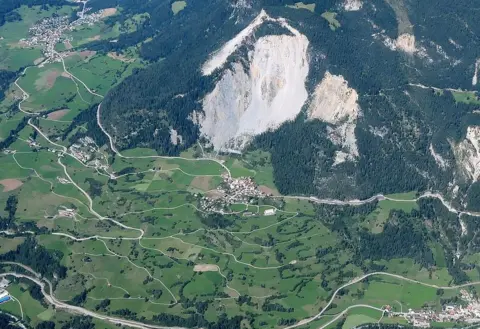Swiss village of Brienz told to flee imminent monster rockslide
 Christoph Nänni, Tiefbauamt GR, Switzerland
Christoph Nänni, Tiefbauamt GR, SwitzerlandResidents of the tiny Swiss village of Brienz have been told to pack their bags and leave immediately.
The reason: two million cubic metres of rock from the mountain above them is set to come loose and crash down to the valley in the next few days.
The evacuation order has not come as a complete surprise to the remaining population of about 70 villagers.
Brienz, in the eastern canton of Graubünden, has been judged a geological risk for some time.
The village itself is built on land that is subsiding down towards the valley, causing the church spire to lean and large cracks to appear in buildings.
Work was under way to try to stabilise that and there were signs the slippage might be slowing down. But ominously, the mountainside above Brienz was in the meantime breaking apart.
Villagers had become accustomed to quite large boulders tumbling down to their gardens below.
Geologists warned that the rock movement was accelerating. Part of the rockface, innocently nicknamed "the island", was by 2023 slipping at a rate of 32m (105ft) every year.
And yet no one thought they would have to leave so soon.
The authorities had warned of a possible evacuation later this summer, and at the end of this week a regular village meeting was scheduled to bring everyone up to date.
Instead, after latest risk assessments showed a rockslide was imminent, the order to get out came suddenly on Tuesday morning. From now on, no-one who doesn't live in Brienz will be allowed to enter, while all villagers must be out by Friday at the latest.
"I love it here, Brienz is a lovely village, it's quiet," one young woman told Swiss media. "It's happened so quickly," said another. "We all thought we would have more time, it's a very strange feeling."
Most have been offered accommodation in neighbouring villages, such as the resort of Lenzerheide, which has plenty of space as the ski season is over and summer has not yet started.
But it's not a permanent solution, and it's not an easy one.
"I'm ready," said one elderly lady, standing on her doorstep with her suitcase. "But I think I'll wait till the last minute."
Many are now asking why a village should suffer such a fate in Switzerland, where building regulations are strict and risk assessment is a continuous process. But Switzerland's Alpine regions are especially sensitive to global warming.
As the glaciers shrink, and the permafrost high in the mountains begins to thaw, the rock becomes unstable.
Lower down, heavier rainfall linked to global warming causes erosion and slippage, and this is what appears to have happened in Brienz. Forecasts of further heavy rain all this week was what prompted the sudden decision to evacuate.
In 2006 huge chunks of rock fell off Switzerland's famous Eiger, causing the closure of hiking trails and prompting geologists to warn that such events could be expected more often.
In 2017, a massive landslide struck the village of Bondo, also in Graubünden, burying half the village and killing eight people.
Last summer, latest measurements showed that Swiss glaciers had lost more than half their volume in the last 100 years.
On Tuesday evening, Brienz's residents, some already with their cars packed outside, gathered for one last update from the authorities.
That innocent sounding "island" is moving even faster, and geologists now say its two million cubic metres of rock is expected to fall in the next seven to 24 days.
How exactly all that rock will fall is not yet clear. It could come down fairly gradually, avoiding most of the village. Or it could come down fast, destroying Brienz entirely.
The consensus among the villagers is that they hope and expect to come back to their homes. The problem is, they don't know if they will still be standing.
